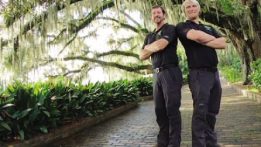 What weighs as much as a refrigerator and gets thrown away every year? Your food waste! In Leon County, an estimated 30,000 tons of food (about 11.4% of all our community’s waste) get sent to the landfill every year, which averages out to 200 pounds of food for every citizen. The good news? Leon County now has a composting drop-off site at the Solid Waste Facility where citizens can drop off acceptable food and yard waste items.
What weighs as much as a refrigerator and gets thrown away every year? Your food waste! In Leon County, an estimated 30,000 tons of food (about 11.4% of all our community’s waste) get sent to the landfill every year, which averages out to 200 pounds of food for every citizen. The good news? Leon County now has a composting drop-off site at the Solid Waste Facility where citizens can drop off acceptable food and yard waste items.
Acceptable food scrap items include:
- Fruit and vegetable scraps
- Expired produce
- Egg shells
- Paper napkins
- Coffee grounds
The compost bins cannot accept:
- Meat or bones
- Dairy
- Food cooked in oil
- Pasta and grains
- Coffee cups
- Bioplastics
But why should we care about food waste? When we waste food, it can have serious negative impacts on food security, the environment, the economy, and climate change. Good food that is thrown away is a missed opportunity to feed someone in our community who is food insecure. According to Second Harvest, one in five people in the Big Bend region are experiencing food insecurity. Environmentally and economically, wasted food is a waste of the resources, land, time, and labor that went into producing, transporting, preparing, and storing it.
Furthermore, when food is sent to the landfill, it emits methane, a powerful greenhouse gas that contributes to climate change. Plus, the nutrients in food are lost when they go to the landfill and can be better used as nutrient-rich compost which helps replenish soil and aids in growing new nutritious food. Food waste is not just uneaten food, or food that has gone bad but also scraps from cooking, such as the tips of onions or banana peels. Even coffee grounds and tea bags can be composted!
What can we do about food waste? The first step is to try to reduce food waste at home. Proper meal planning, food storage, and thoughtful eating can help reduce food waste. If you have excess or unused food at home or at your workplace, donating to a local organization is a great option. Lastly, if the food cannot be eaten or donated, its next best use is to be composted.
What is composting? Composting is the natural process of recycling organic matter into a useful fertilizer. Everything that grows will eventually decompose, and composting speeds up the process by providing an ideal environment for decomposition. The resulting decomposed material, which looks a lot like soil, is called compost; it is rich in nutrients and can be used to supplement garden soil. Compost is not just made up of food scraps; you can include fall leaves, grass trimmings and other plant waste from your garden in your compost material, which is ideal for helping break down the food waste.
But what about yard waste? How can I better manage yard waste? As mentioned above, small yard debris can be composted at the County’s composting site at the Solid Waste Facility or in a small yard composter. Large yard debris, such branches and trimmings, can be put out for collection. After yard debris is collected, it is mulched at the Solid Waste Facility and is available for free to Leon County citizens.
Amazing! So, how can I start composting? Leon County’s new pilot compost drop-off site at the Solid Waste Facility (7550 Apalachee Pkwy) is located next to the mulch pick-up area, and there is clear signage regarding what can and cannot be thrown into the compost bins. Residents will be able to bring their food scraps to drop off into the compost bins, along with the items already accepted at the Solid Waste Facility, including garbage (for unincorporated residents only), recycling, household hazardous waste, and electronics. Don’t forget to pick up any needed household paint or cleaners from the Renew Center or mulch from the free mulch pile.
Initially, the County plans to use the compost at County facilities but may offer it to community gardens or other organizations in the future. If this pilot project is successful, the County will look at other opportunities to expand the drop-off program to other facilities in the county.
If you’d rather learn the art of composting on your own, you can purchase your own composting bin through Leon County Government at the wholesale cost, which reduces the cost of the bin significantly. There are also numerous resources about composting from the Leon County UF/IFAS Extension Office. Furthermore, if you are looking for traditional composting pick-up, Compost Community is a great local resource. Learn more at GrowingGreen.org/Composting.![]()




